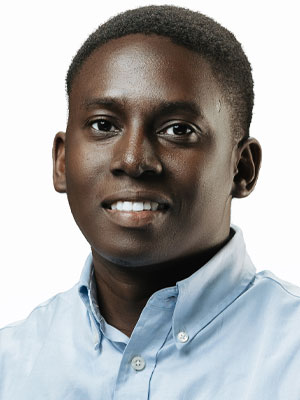Berkeley Public Health student profile: Nigel Okot Kinyera
Winner of 2025 Dean’s Health Equity and Leadership Scholarship

- Online MPH, Epidemiology and Biostatistics concentration
- Expected Graduation: 2027
- Hometown: Kampala, Uganda
- Preferred Pronouns: He/him
Why did you choose to go into public health and why did you choose UC Berkeley School of Public Health for your degree?
As a research pharmacist at Baylor Foundation Uganda (BFU) in Kampala, my work supporting NIH/DAIDS-funded clinical trials has given me a frontline view of the persistent HIV epidemic in Uganda.
Contributing to studies within global research networks like the International Maternal Pediatric Adolescent AIDS Clinical Trials and the HIV Prevention Trials Network, I have witnessed a stark reality. While a lot of progress has been made in HIV care globally, significant gaps remain for vulnerable populations like adolescents, young women, and children.
At BFU, over 3,500 adolescents annually receive specialized HIV care and I have seen firsthand how challenges like social stigma, limited access to adolescent-specialized services, and the slow but steady emergence of dolutegravir resistance threatens their progress. These barriers reflect the broader challenges in adolescent HIV care across low-resource settings. This experience has strengthened my resolve to pursue public health training to develop impactful, data-driven solutions to close these gaps.
UC Berkeley easily stood out for me when I was looking for a school of public health because of its commitment to health equity—which I’m passionate about—and its focus on data-driven solutions and innovation. Its strong alumni network also creates a platform for collaboration. And the flexible Online MPH program allows me to continue my impactful work in HIV clinical trials in Uganda.
Why did you choose your concentration and what interests you about it?
My decision to pursue the epidemiology and biostatistics concentration stems from a passion for clinical research and fascination with the power of data to inform vital health decisions. To make impactful contributions to health through research, sharpening my data analysis skills is not just essential,it’s the core of what drives me. This concentration is the right foundation to hone these analytical skills and excel in the area.
Epidemiology and biostatistics are central to evidence-based research in health. Collecting and analysing data to extract meaningful insights has the potential to impact health positively. This concentration uniquely combines a comprehensive understanding of disease patterns through epidemiology with the statistical expertise in biostatistics required to address
complex health data. This will equip me with the knowledge to advance in the field and contribute significantly.
Ultimately, my goal is to make a significant difference in HIV research. This concentration directly resonates with these aspirations, providing the right training in study design and statistical inference that I need to contribute effectively to addressing gaps in HIV care.
You received the Dean's Health Equity and Leadership Scholarship. What does that mean to you? Can you tell us more about your thoughts on health equity?
It is an honor to be selected for this esteemed recognition. I am very excited about this opportunity, which strengthens my resolve to contribute to health equity through research in under-resourced settings. To me, health equity means ensuring that every person, regardless of geographical location, race, sex, age or socioeconomic status, has a fair chance at good health. I’ve witnessed how stigma, limited access to tailored services, and social exclusion can undermine health outcomes. Addressing these disparities is vital to improving health equity. This scholarship will allow me to complete my degree at UC Berkeley and bring back new skills and a new perspective to the community I work with in Uganda—adolescents living with HIV. I hope my future work will help level the playing field for this population.
What element of public health would you most like to change?
I am passionate about transforming adolescent HIV care in low and middle-income countries . I want to improve treatment adherence and viral suppression among this often-overlooked group by advancing adolescent-responsive HIV services and advocating for policies that fully include their unique needs. My goal is to help close the gap in outcomes between adolescents and other age groups, ensuring no one is left behind in the HIV response.
What would you like to do with your degree after graduation?
I plan to implement projects to explore and improve adolescent HIV health care in Uganda. I aim to influence national and regional policies, contribute to developing more responsive HIV care models, and strengthen research capacity by mentoring emerging public health scientists.
I also hope to foster collaborations between UC Berkeley and institutions like Baylor Foundation Uganda to advance global health security and equity.
How do you think UC School of Berkeley Public Health will set you up for success in your future career?
UC Berkeley School of Public Health offers a unique blend of academic excellence and global application, with a strong emphasis on social justice.
Its extensive international and multidisciplinary network will refine my leadership abilities and broaden the reach of my advocacy for equitable health systems for adolescents in Africa and beyond. And working while studying provides a distinctive opportunity to practice and apply what I learn in real time, further enhancing my experience
This interview has been edited for length and clarity.